More Than Two Dozen New U.S. Citizens Took Oath at Rutgers Law
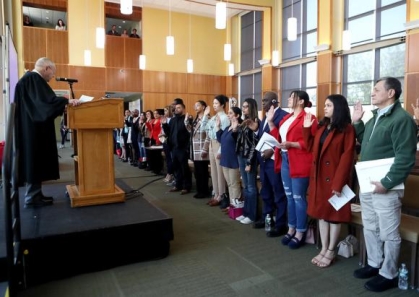
More than two dozen people from 18 countries took the U.S. Naturalization Oath of Allegiance to the United States and became U.S. citizens in an emotional ceremony at Rutgers Law in Camden on April 19. The event also marked the 10th anniversary of the Rutgers Law Immigrant Justice Clinic.
Linda K. Albarouki, a native of Venezuela, was one of 27 new U.S. citizens who lifted her right hand, repeated the Oath, and received her Naturalization certificate as friends and family looked on. “I feel very excited and grateful. It was a great experience,” she said. “I feel very happy that this happened. I always say that things happen for a reason, and you never have to ask why.”
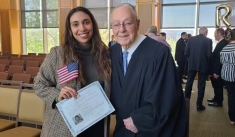
Senior U.S. District Judge Hon. Joseph H. Rodriguez ‘58 administered the Oath and delivered a powerful keynote speech, demonstrating how his life has come full circle as a first generation American himself. Judge Rodriguez was born in Camden to a Puerto Rican mother and Cuban father who survived the 1918 sinking of the passenger liner SS Carolina. Judge Rodriguez became the first Latino appointed to the federal bench when he was appointed to the U.S. District Court for the District of New Jersey in 1985. He took his oath for the Bench in the same courtroom where his father took the Naturalization Oath. Coincidentally years later, Judge Rodriguez wrote the court order protecting the salvage efforts of divers who rediscovered the wreck of the SS Carolina off the coast of Atlantic City, New Jersey where it sank.
“American liberties are now your liberties,” Judge Rodriguez told the new citizens.
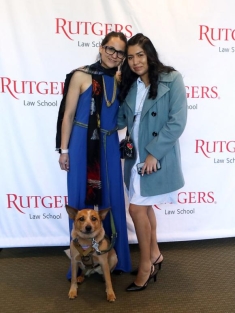
That wasn’t the only full circle moment. Xiomara Uran ‘15 originally represented Aleyda Ruiz Ceron as a law student in the Immigrant Justice Clinic when Ceron was a high school student who began seeking asylum in 2014. Uran traveled from Washington State to witness Ceron become an American citizen at the ceremony. Uran, a native of Colombia, is now working as an immigration attorney representing immigrant detainees.
“It was a very emotional case for me,” Uran said. “It meant a lot because had I not had the privilege of my parents’ education, and what that implied in the visa system, I myself would have had to seek asylum in the United States.” Click here to read more about Uran’s story.
Rutgers Law clinic students Layla Al Tukmachi ’23 and Nayomi Torres-Velez ’24 also represented Ceron in her naturalization process and were there to help her celebrate the moment.
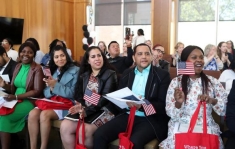
Immigrant Justice Clinic Director Joanne Gottesman said, “As a clinical professor, it doesn’t get much better than this: having the chance to celebrate with a client at the end of a long and arduous immigration journey, to see former students using their talents to represent those least able to access a lawyer, and connecting former and current students with each other, and with a shared client and her family.”
In her remarks, Professor Gottesman mentioned that there are four ways to become a United States citizen. “Three are by operation of law – essentially automatic once the requirements are met,” she said. “The fourth way, citizenship through naturalization, requires many affirmative acts and difficult decisions, usually over a period of years or even decades. It often involves some pain and loss—leaving family and friends, your native language, and familiar and beloved foods and scents. It is the culmination of that process, and the opportunities for increased civic engagement that citizenship brings, that we pause to recognize here today with you and your families and friends.”
Several members of the Rutgers Law community also spoke about their own, or their families’, citizenship journeys including Professor Emeritus Roger S. Clark and Rutgers Immigrant Community Assistance Project (RICAP) Managing Attorney Jason Hernandez.
The Rutgers Immigrant Justice Clinic represents low-income South Jersey residents in immigration matters, focusing primarily on removal defense and representation of victims of crime. Legal assistance is provided by law students acting under the supervision of a licensed attorney.
(Watch “Rutgers Stories of Citizenship” below, which was produced for the ceremony by filmmakers Mary Hewey, RICAP Paralegal, and her partner Jen Bagley of Wilmarth Gertie Photodrama.)
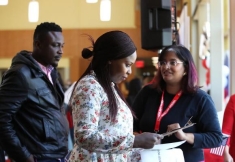
Engagement, led Rutgers Civic Scholars and volunteers
from RUC Votes Coalition in a voter registration drive.
Hernandez said, “Citizenship is not required to contribute to your community, but it certainly empowers one to shape and participate in it, in a new way. Register to vote, vote in primaries, vote in general elections, apply for government jobs, petition for family members from whom you’ve been separated, travel freely and, most of all, live without fear that you do not belong here, because you do. Welcome home.”
In that vein, Simanti Lahiri, Program Coordinator for Student Civic Engagement, led Rutgers Civic Scholars and volunteers from RUC Votes Coalition in a voter registration drive for new citizens after the ceremony.
Special thanks to the Field Director Keith Dorr and the staff of the United States Citizenship and Immigration Services Mount Laurel Field Office for collaborating on the event.